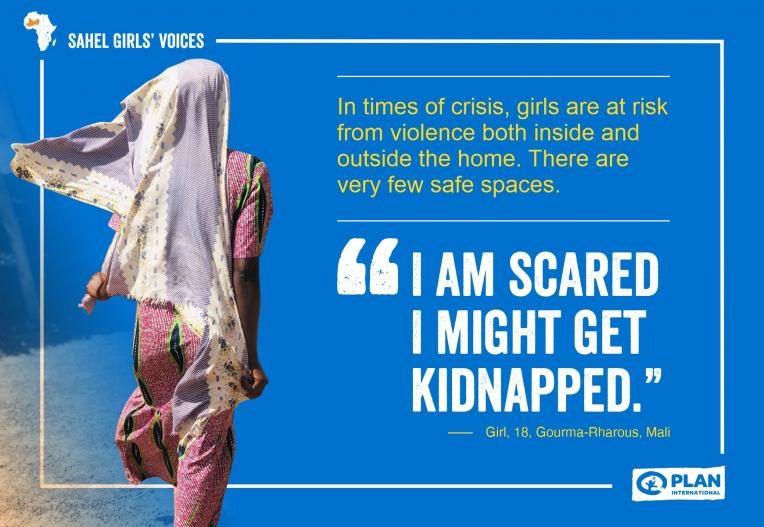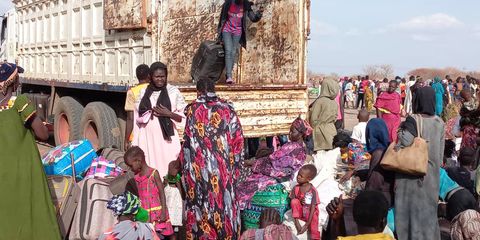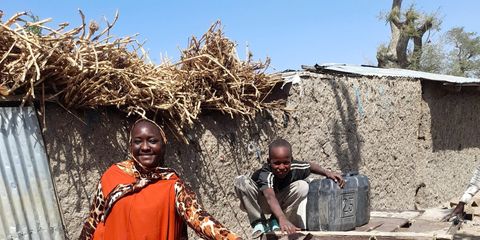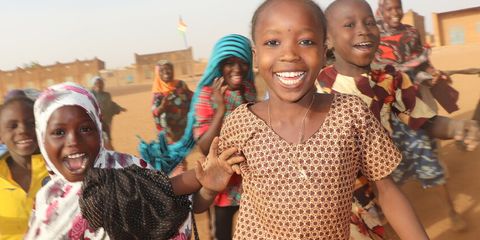11 DECEMBER 2020
Conflict and displacement are driving escalating levels of violence, exploitation and abuse against girls and young women in the Sahel region of West Africa

A vicious cycle of gender-based violence (GBV) driven by conflict and displacement across three central Sahel countries: Mali, Burkina Faso and Niger, is creating a protection crisis for girls and young women, warns child rights and humanitarian organisation Plan International.
The scale and severity of humanitarian need is reaching unprecedented levels, with 13.4 million people affected by forced displacement, lack of access to essential basic services, school closures, protection issues and food insecurity. Girls and young women are particularly hard hit in crises or emergencies, due to harmful social norms and double discrimination based on age and gender.
Rotimy Djossaya, Plan International West and Central Africa Executive Director, said: “Violence and the fear of violence are facts of daily life for adolescent girls in the most insecure regions of the Central Sahel. Not only are girls scared to leave the house, they are also having to contend with their vulnerability to ‘everyday GBV’ in the home, including forced marriage, physical and sexual violence or sexual exploitation.
“This was already a multi-faceted and complex crisis, and in 2020 it’s been compounded by the social and economic consequences of the COVID-19 pandemic. We’re at the stage now where the situation demands urgent action and funding from the international community.”
There has been an increase in reports of communities of women and girls being abducted, sexually assaulted and raped, including in the Mopti region of Mali where more than 1,000 cases have been recorded in the area so far in 2020.
Violence restricting girls’ lives
Plan International’s research, Adolescent Girls in Crisis: Voices from the Sahel, released in June this year, revealed that girls’ lives have been turned upside down by violence and instability. In interviews and focus group discussions, girls disclosed that restrictive norms and attitudes of their families and communities have left them feeling trapped and powerless.
“Often you can’t do what you want, because you don’t belong to yourself,” said Aminata* from Burkina Faso.
The Central Sahel is also one of the fastest growing displacement crises, with almost 2 million internally displaced people (IDPs), and 850,000 refugees fleeing across borders and moving from one conflict to another. Those who are internally displaced must live within host communities, where living conditions have deteriorated in 2020 as a consequence of the COVID-19 pandemic.
In the Centre-North region of Burkina Faso alone, there are more than 430,000 IDPs, more than half of whom are under 14. Zourata, 16, lost the use of her legs due to an illness at the age of nine. She no longer goes to school but does attend Plan International’s Child Friendly Spaces.
Her mother Mariam said: “I have three children and I manage to feed them without the help of their father. Sometimes I want to give up, but when I look at my daughter’s condition, I tell myself that I can’t leave her alone.”
Child Friendly Spaces is just one of countless projects Plan International runs in the region. But with rising food insecurity, school closures and the continued effects of the COVID-19 pandemic further compounding GBV and exploitation, girls are more at risk than ever.
Action needed on girls’ rights in the Sahel
Plan International is calling for the international community to address and prioritise the specific rights and needs of adolescent girls in the Central Sahel region. A gender lens must be applied when planning any humanitarian and development interventions, and when helping to build resilience in the region.
The organisation is also calling for all humanitarian responses to allocate sufficient resources to tackle gender issues such as GBV and to urgently prioritise child protection needs.
Mr Djossaya added: “Girls’ voices must be listened to, and their potential to contribute to both social and economic development and conflict resolution recognised.
“The Central Sahel crisis is also a protection crisis. Protection needs must therefore be reflected in all responses, whether that’s consistently allocating resources, respecting fundamental rights or increasing access to services, security and justice.”
*names have been changed
About Plan International
Plan International is an independent development and humanitarian organisation that advances children’s rights and equality for girls. Working together with children, young people, our supporters and partners, we strive for a just world, tackling the root causes of the challenges facing girls and all vulnerable children.
We believe in the power and potential of every child. But this is often suppressed by poverty, violence, exclusion and discrimination. And it is girls who are most affected. Working together with children, young people, our supporters and partners, we strive for a just world, tackling the root causes of the challenges facing girls and all vulnerable children.
We support children’s rights from birth until they reach adulthood. And we enable children to prepare for – and respond to – crises and adversity. We drive changes in practice and policy at local, national and global levels using our reach, experience and knowledge.
We have been building powerful partnerships for children for over 80 years and are now active in 75 countries.
Categories: Emergencies


